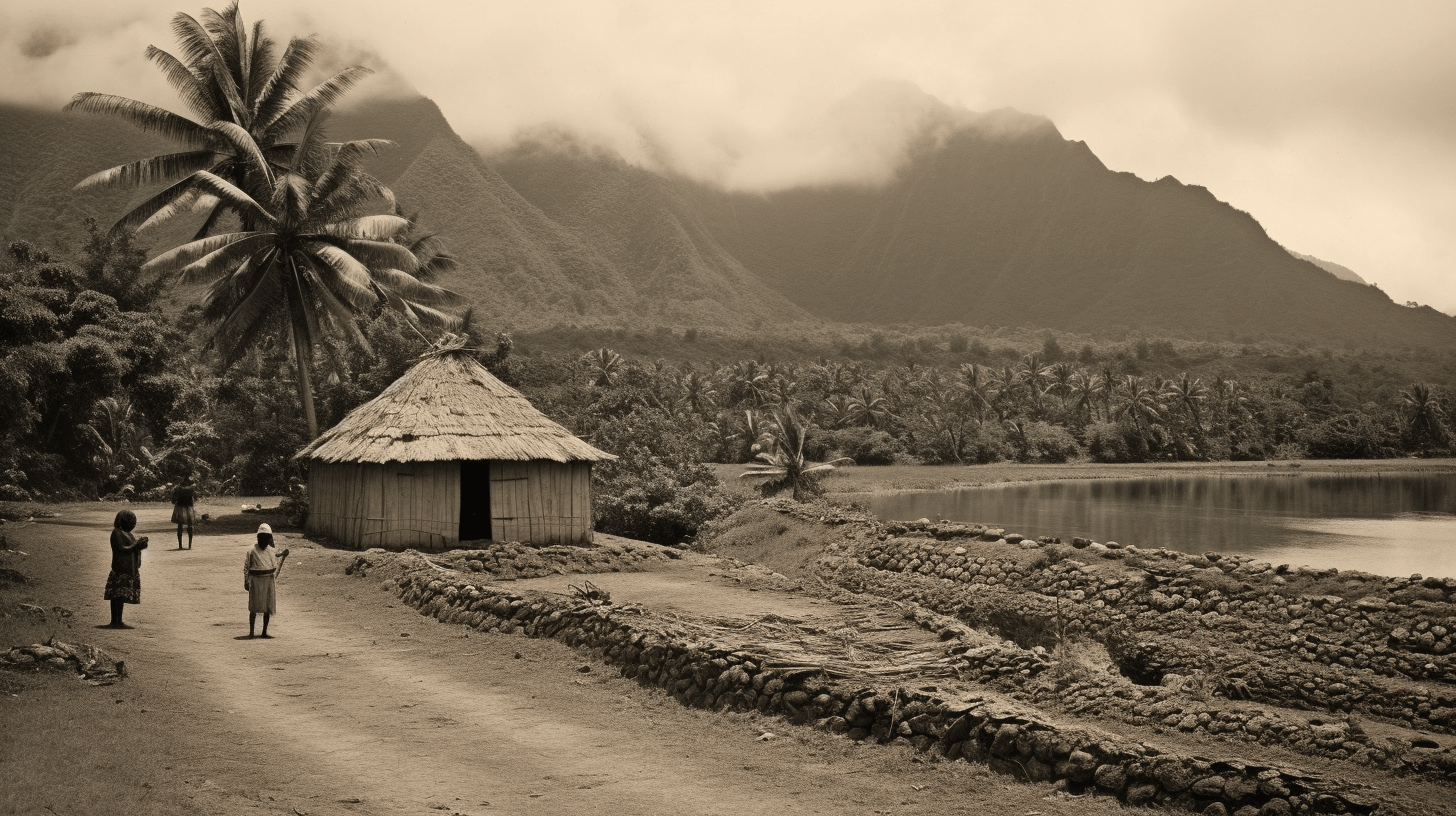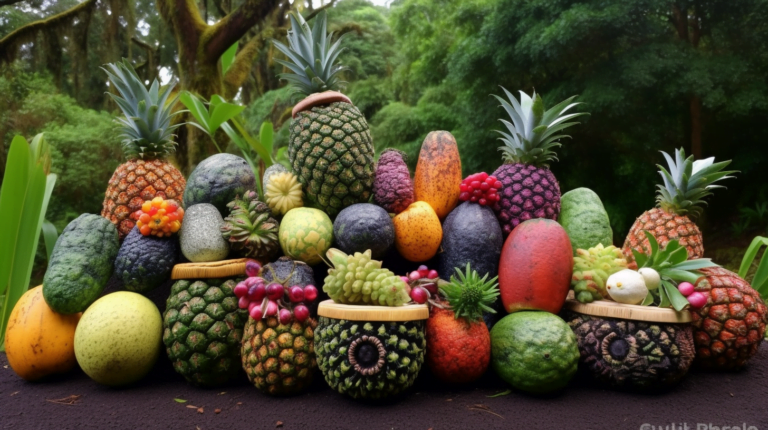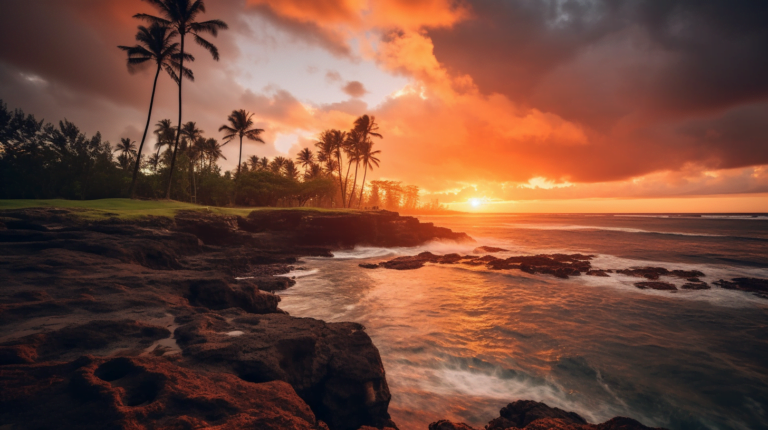Unveiling the Enchanting History of Kauai 🌺
Aloha, fellow history enthusiasts and wanderlust-filled adventurers! Step back in time with us as we explore the fascinating history of Kauai, Hawaii’s oldest and most enchanting island.
From its volcanic origins to ancient Polynesian settlers and European explorers, Kauai boasts a rich tapestry of cultures woven together over millions of years.
Key Takeaways
- Kauai was first settled by Polynesians around 200 AD, who brought with them a rich and unique culture that is still celebrated today.
- European exploration in the late 18th and early 19th centuries led to colonization of Kauai by the United States. This period brought about major changes to the island’s economy and culture, but remnants of its colonial history can still be explored at various sites on the island.
- Efforts to preserve Kauai’s heritage and natural landscape are ongoing. By exploring historic landmarks like Kilohana Estate or hiking through rugged terrain, visitors can appreciate just how important this connection between land and people remains today.
Early Polynesian Settlements And Hawaiian Culture
Polynesians first settled in Kauai around 200 AD, bringing with them their culture and traditions that slowly developed into the unique Hawaiian society we know today.
Polynesians First Settled In Kauai Around 200 AD
Stepping back in time to around 200 AD, Kauai was first inhabited by skilled Polynesian adventurers who bravely embarked on a remarkable sea voyage that spanned nearly 2,000 miles.
These ancient navigators, hailing from the Marquesas archipelago, were motivated by both exploration and the search for new lands.
Upon discovering this untouched paradise with its fertile lands and bountiful resources, these early settlers went on to lay the foundation of what would become Hawaii’s rich native culture.
They brought along taro plants and raised pigs while building fishponds for sustenance. Gradually establishing thriving communities all over the island chain – including Kauai – these hardy inhabitants nurtured complex societal structures alongside an array of customs rooted firmly in nature and spirituality.
Development Of Hawaiian Traditions And Society
As the Polynesians settled in Kauai around 200 AD, they brought with them a rich and unique culture that has evolved over the centuries. Hawaiian traditions and society center around respect for nature, family values, and spiritual beliefs.
The Hawaiians developed an intricate social hierarchy consisting of chiefs (ali’i) and commoners (maka’ainana). They celebrated their gods through elaborate ceremonies known as hula dances, which involved storytelling through song accompanied by precise hand gestures.
In ancient times, Hawaiians were experts at fishing, agriculture, canoe building, surfing, and traditional medicine.
Kauai’s Colonial And Post-Colonial History
European explorers arrived in Kauai in 1778, with Captain Cook stepping ashore at Waimea Bay. The island’s strategic location and natural resources made it a prized possession for colonial powers.
European Exploration And Annexation By The United States
During the late 18th and early 19th centuries, European explorers came to Kauai in search of new resources. The island’s abundance of sandalwood trees led to a thriving export industry that attracted traders from all over the world, including American merchants who established permanent settlements on Kauai.
In 1893, US businessmen overthrew Hawaii’s monarch and requested annexation by the United States, which was granted five years later. This period of colonization brought about major changes to Kauai’s economy and culture, as sugar plantations replaced traditional agriculture practices and English became the predominant language.
Economic And Social Developments In Modern Times
In recent decades, Kauai has experienced significant economic and social changes. The tourism industry has grown rapidly, with many visitors attracted to the island’s natural beauty and outdoor activities.
This growth has brought about new job opportunities for locals, but it also poses challenges related to preserving the island’s delicate environment. Additionally, there have been efforts to diversify the island’s economy beyond just tourism by promoting agriculture and renewable energy initiatives.
Socially, Kauai has become more diverse as people from all over the world come to live and work on the island.
KEYWORDS: Tourism industry, natural beauty, outdoor activities, job opportunities, environment preservation , diversify economy , agriculture promotion , renewable energy initiatives , social diversity
Heritage And Preservation Efforts In Kauai
Efforts to preserve Kauai’s heritage and historical sites are ongoing, with a focus on the preservation of Hawaiian culture and the natural landscape that has played such an integral role in shaping its history.
Preservation Of Hawaiian Heritage And Historical Sites
As someone who appreciates discovering the history and culture of a place, I always make sure to visit Kauai’s many heritage sites during my trips. One such site is the Kilauea Lighthouse, which served as a beacon to ships navigating the treacherous waters surrounding Kauai for over 60 years.
Another important historical site in Kauai is Kilohana Estate, once one of Hawaii’s most prosperous sugar plantations. Visitors can now tour the restored estate on foot or by train ride through its beautiful gardens while learning about plantation life in Hawaii’s past.
Importance Of Kauai’s Natural Landscape To Its History And Culture
Kauai’s natural landscape plays a significant role in its history and culture. The island is home to towering cliffs, stunning waterfalls, and pristine beaches that have been shaped by millions of years of volcanic activity.
Kauai played a critical role in the development of Hawaiian traditions as ancient Polynesians settled on its shores over 1500 years ago.
Today, visitors can explore this history and culture while taking in the awe-inspiring natural beauty around them. For instance, you can visit Waimea Bay- where British explorer James Cook first landed on Hawaiian soil over two centuries ago- or hike through the rugged terrain to see some of the island’s most breathtaking views.
The continued preservation efforts at Kauai stand testament to just how important this connection between land and people remains today. Efforts are underway across the island aimed at preserving historic landmarks and telling stories that help tie current generations back into their ancestral roots.
Conclusion
As we conclude our journey, let’s reflect on the rich tapestry that composes Kauai’s vibrant past. Its story commences with the early Polynesian settlements, and it weaves through the intricate patterns of Hawaiian culture. Kauai has weathered the storms of colonialism and annexation by the United States, emerging into a new era marked by significant economic and social developments.
Yet, amidst these changes, Kauai has remained a steadfast sentinel of heritage, with dedicated efforts focused on the preservation of timeless Hawaiian traditions and historical sites. This marriage of past and present, heritage and progress, is what makes Kauai truly magical.
Yearning to delve deeper into the enchanting allure of this island paradise? Our comprehensive Kauai Travel Guide is your gateway to uncover all that Kauai has to offer. From its breathtaking landscapes to its pulsating cultural scene, your Kauai adventure awaits. Embark on it today!
Frequently Asked Questions
What is the history of Kauai?
Kauai has a rich history that dates back over 1500 years, when it was first settled by Polynesians from the Marquesas Islands. Since then, the island has been under the rule of various chiefs and kings before being annexed by the United States in 1898.
What are some significant landmarks or attractions related to Kauai’s history?
Some landmarks related to Kauai’s history include Kilohana Plantation, Waimea Canyon State Park, and Hanalei Valley Lookout. Other popular attractions include historic sugar plantation towns like Lihue and Kapaa, as well as ancient Hawaiian fishing villages along the island’s coastline.
How did Western missionaries impact Kauai’s history?
In 1820, Christian missionaries from New England arrived on Kauai and other Hawaiian islands with intentions to convert Hawaiians into Christianity while also introducing them to European farming methods and western education systems. The arrival of these missionaries marked an important turning point in Hawaii’s cultural transformation.
Why is tourism such an important aspect of Kauai’s economy?
Tourism plays an integral role in the economy of Kauai since it provides income for local residents through jobs created by travel-related businesses. Additionally, tourism helps preserve many historical sites on Hawaii’s oldest island while also providing visitors with opportunities to learn about its fascinating past through guided tours or engaging events u0026amp; exhibits at museums around town!







